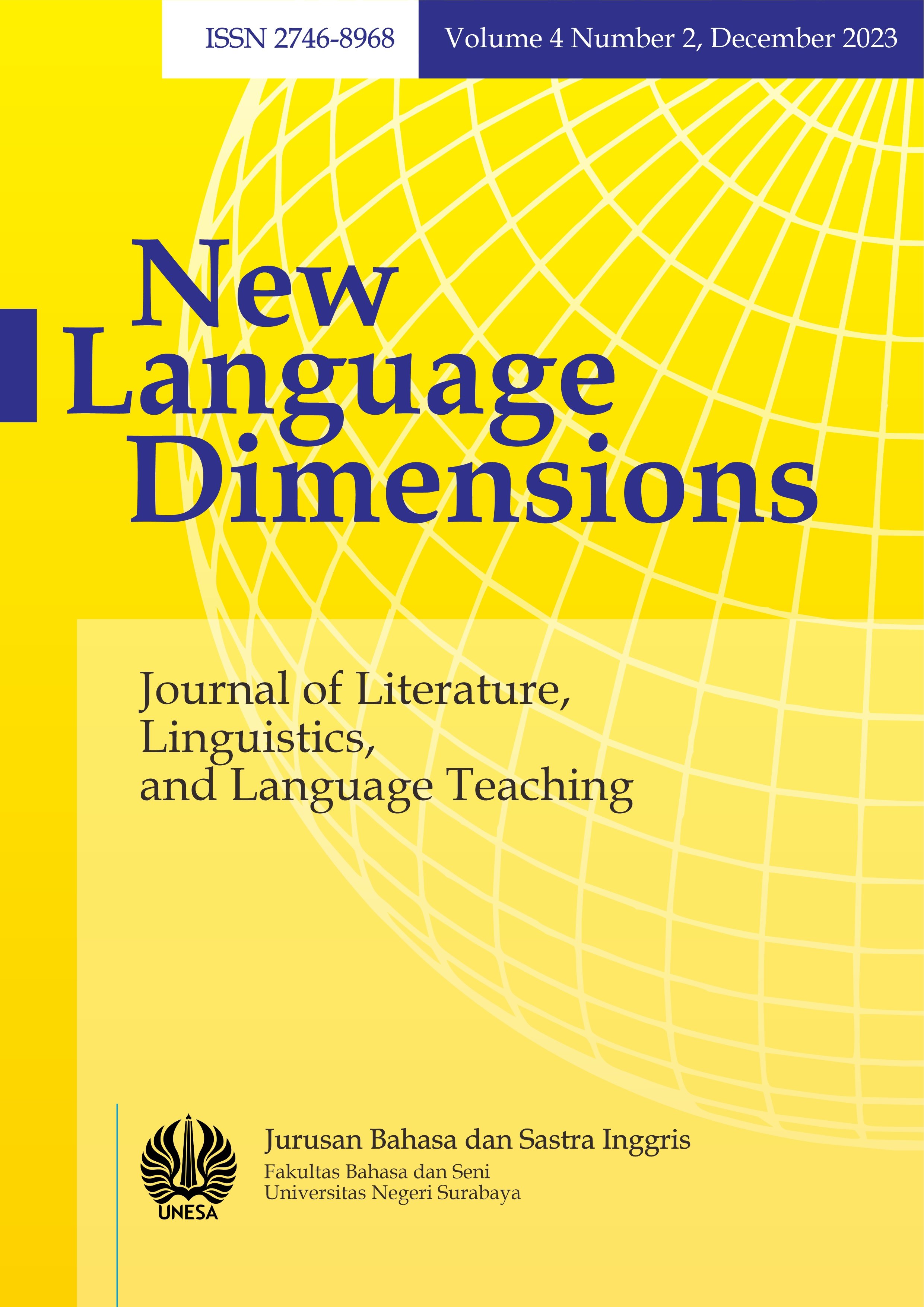Current Status of Supplementary English Programs in East Java Indonesia
DOI:
https://doi.org/10.26740/nld.v4n2.p117-126Keywords:
Indonesia, high school, suplementary English program, English trendAbstract
This study aimed to investigate the position of supplementary English programs in senior high schools in Indonesia and the use of literature and linguistics in the program. This research employed a mixed method using a survey with a semi-structured questionnaire. Twenty-seven English teachers of senior high schools in East Java were invited through the social media WhatsApp Group to fill in the Google Form. It was found that not many supplementary English programs are run in senior high schools in East Java. The small number of students in the language programs also shows that few students choose supplementary English programs over other programs. Moreover, teachers employed various literature genres, linguistics, and sociolinguistics during classroom activities. The teachers of supplementary English programs in Indonesia also introduced students to intercultural communicative competence. It can be concluded that even though the supplementary English programs in senior high schools in East Java are small in number, their implementation is thriving and promising for ELT in the future.
Downloads
References
Ahmad, S., & Rao, C. (2013). Applying communicative approach in teaching English as a foreign language: a case study of Pakistan. Porta Linguarum, 20(June), 187-203.
Akbary, M., Shahriari, H., & Hosseini Fatemi, A. (2018). The value of song lyrics for teaching and learning English phrasal verbs: a corpus investigation of four music genres. Innovation in Language Learning and Teaching, 12(4), 344-356. doi:10.1080/17501229.2016.1216121
Brown, H. D., & Lee, H. (2015). Teaching by principles: an interactive approach to language pedagogy (Fourth edition ed.). White Plains, NY: Pearson Education.
Celce-Murcia, M., Brinton, D., & Snow, M. A. (2014). Teaching English as a second or foreign language (Fourth edition ed.). Boston, MA, USA: National Geographic Learning.
Cheng, C.-H., & Chen, C.-H. (2022). Investigating the impacts of using a mobile interactive English learning system on the learning achievements and learning perceptions of student with different backgrounds. Computer Assisted Language Learning, 35(1-2), 88-113. doi:10.1080/09588221.2019.1671460
Dro?dzia?-Szelest, K., & Pawlak, M. (2013). Psycholinguistic and sociolinguistic perspectives on second language learning and teaching. Heidelberg: Springer.
Hakimantieq, H., Suherdi, D., & Gunawan, W. (2022). Duolingo as A Mobile-Assisted Language Learning: A New Supplementary of Learning Basic English Reading for EFL Students. Edukatif : Jurnal Ilmu Pendidikan, 4(6). doi:10.31004/edukatif.v4i6.4104
Harlina, H., & Yusuf, F. N. (2020). Tantangan belajar bahasa Inggris di sekolah pedesaan. Jurnal Penelitian Pendidikan, 20(3), 325-334.
Joshi, A., Kale, S., & Chandel, S. (2015). Likert scale: Explored and explained. British journal of applied science & technology, 7(4), 396-403.
Kachru, B. B. (1992). The other tongue: English across cultures. Illinois: University of Illinois press.
Kemendikbudristek. (2014). Peraturan Menteri Pendidikan Dan Kebudayaan Republik Indonesia Nomor 64 Tahun 2014 Tentang
Peminatan Pada Pendidikan Menengah. Jakarta: Kemendikbudristek.
Keputusan Kepala Badan Standar, Kurikulum, dan Assessment Pendidikan Kementerian Pedidikan, Kebudayaan, Riset, dan Teknologi Nomor 008/H/KR/2022, (2022).
Liddicoat, A. J., & Scarino, A. (2013). Intercultural language teaching and learning. London: John Wiley & Sons.
Mattarima, K., & Hamdan, A. R. (2011). The teaching constraints of English as a foreign language in Indonesia: The context of school based curriculum. Sosiohumanika, 4(2), 287-300.
Muhfiyanti, M., & Aimah, S. (2018). Persepsi Siswa Terhadap Materi pembelajaran Bahasa Inggris Peminatan pada Siswa SMA N 15 Semarang. Paper presented at the Prosiding Seminar Nasional Mahasiswa Unimus.
Nikolov, M. (2016). Assessing young learners of English: Global and local perspectives. New York: Springer.
Purba, N. A., & Saragih, M. (2022). Peningkatan hasil belajar bahasa Inggris melalui aplikasi Duolingo dalam pembelajaran online di tengah Covid-19 pada siswa SMP Katolik Delimurni Delitua. Jurnal Ilmiah Aquinas, 5(1), 32-38.
Rasti-Behbahani, A., & Shahbazi, M. (2022). Investigating the effectiveness of a digital game-based task on the acquisition of word knowledge. Computer Assisted Language Learning, 35(8), 1920-1945. doi:10.1080/09588221.2020.1846567
Renandya, W. A., & Widodo, H. P. (2016). English Language Teaching Today: Linking Theory and Practice (Vol. 5). Cham: Springer International Publishing.
Richards, J. C., & Rodgers, T. S. (2014). Approaches and methods in language teaching (Third edition ed.). New York: Cambridge University Press.
Setiyati, C., & Mariah, S. (2019). Manajemen Program Peminatan Peserta Didik di SMA. Kelola: Jurnal Manajemen Pendidikan, 6(2), 146-156.
Sulistiyo, U., Haryanto, E., Widodo, H. P., & Elyas, T. (2020). The portrait of primary school English in Indonesia: policy recommendations. Education 3-13, 48(8), 945-959.
Downloads
Published
Issue
Section
 Abstract views: 178
,
Abstract views: 178
, PDF Downloads: 180
PDF Downloads: 180











